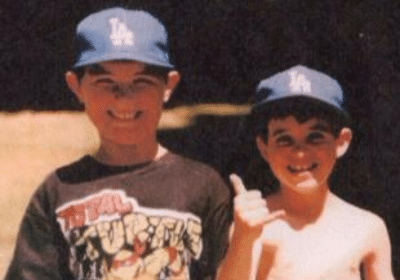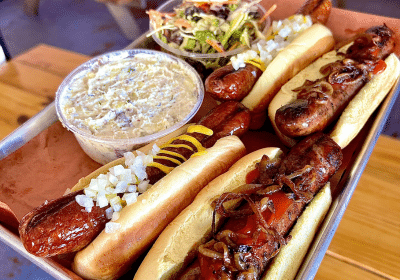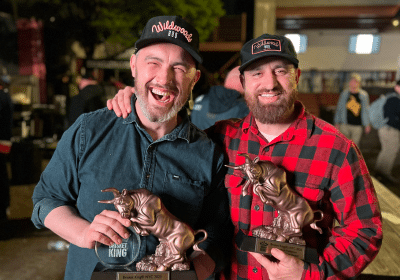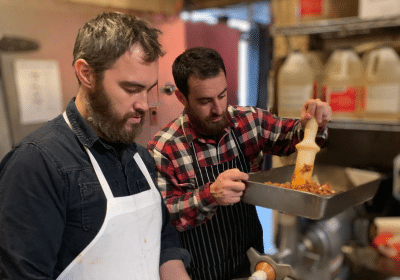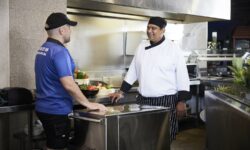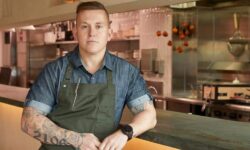Aussie snags on the Jersey Shore: Meet the Canberra-bred pitmasters introducing America to the glammed-up Bunnings sausage.
Two barbecue-loving Australian chefs are taking on America’s legendary pitmasters at their own game, attracting huge queues at their BBQ restaurant on the Jersey Shore. So how did best mates David Gill and Joel Romano end up smoking brisket and Aussie snags on a skinny island off the south-western tip of New Jersey? Food journalist Wendy Hargreaves finds out.

It goes off like a frog in a sock, of course.
Long queues snake out the door of Wildwoods BBQ every night in the busy summer months, with some customers crossing state lines for a taste of Australia in a quintessential American barbecue restaurant.
So how did Aussie pitmasters and best mates David Gill and Joel Romano end up cooking award-winning barbecue in the small beach town of North Wildwood, New Jersey?
It all started when they met as pre-schoolers at a Canberra kindergarten back in the last century.
But first… let’s find out more about their cult beef sausage.
Q: You’ve upped the ante on the ubiquitous Bunnings snag on the other side of the world. Were you surprised by the success of your Aussie sausage?
DAVID: I’m as Occa as you can get, and I love a beef sausage in bread. You get that aah moment every time, and I love seeing the faces of Americans the first time they try it. We make our Aussie sausage using scraps of our brisket, so it’s very affordable. It’s a great recipe and a beautiful thing, with sweetness, garlic and smoke, cooked to order. We cook the garlic really slow, so it’s not quite raw, but not over roasted. Then you get the freshness of the parsley, and the bite and slight sweetness of charred up onions. We smoke it first, and then put it on the grill. And then we serve it in a long potato roll, with great tomato sauce. It’s an elevated version of a sausage you’d get from Bunnings and it makes you feel good from the first bite. But I think I have a thing for fatty protein encapsulated in a skin. It keeps everything very moist.
JOEL: Our beef sausage is our most successful barbecue experiment so far. We worked on it for years and wanted to do something with the brisket that didn’t involve cheese, which most BBQ restaurants do. We also wanted to tell the story of the working-class Aussie BBQ that we were brought up eating. With tomato sauce, of course.
We get Australians down here looking for the sausage every week. They come from Philly, New York City and DC. All over the place. It’s that combination of the bread, sauce and onion.
Q: How did you come up with the recipe?
DAVID: It’s always a process. We come up with a recipe and we make it and we change it and by the tenth time, we might get it right. Our beef sausage didn’t happen overnight, but now it’s something you can hang your hat on. As a chef, you’re only as good as your recipes, and we’re lucky to have a really good culture inside the restaurant, so we’re able to delegate and produce the same quality of food all the time. We don’t have to be in the building 100 per cent of the time. We can inspire the next batch of chefs and pitmasters. It’s all about creating that culture and that team.
We also love to get on the road. A few weeks ago, we competed in our first professional BBQ competition – Brisket King in New York City. There were more than 1000 people there and we won both the People’s Champ and Judges’ Choice awards. We went in with our sliced brisket, but also served our Aussie beef sausage sandwich. It was very popular.
Q: David… you ran the pit at Brooklyn’s esteemed Hometown Bar-B-Que for six years and could’ve branched out on your own anywhere in America. Why choose the back blocks of North Wildwood?
DAVID: I’ve been following my best mate since kindergarten, and I still do. Joel’s ex-girlfriend came from South Jersey, so he knew the island and he saw the opportunity for us. We’d been talking about going into business together for as long as I can remember, and we finally did it in 2021.
We’d also spent the summer of 2005 golf caddying together in Philadelphia. Joel has dual citizenship through his American father, while I went back and forth on work visas for about seven years. I was bartending for a while and Joel ran a couple of restaurants in Philly (including the acclaimed Goat’s Beard). He was encouraging me to quit bartending and go full-time into cooking, so I joined the Hometown pit crew and stepped into my first week with 350 briskets to cook. You learn pretty quick. I was a sponge ready to learn. And when we closed on Mondays, I went down to Philadelphia to work with Joel. I wanted to learn how to actually cook. Then Joel started coming to Hometown BBQ on Sunday nights for dinner, so we’d cook BBQ together on Mondays.
JOEL: We spent a lot of time experimenting and perfecting briskets. We knew the time had come to go out on our own. That was the summer of 2021.
Q: North Wildwood swells from 6000 permanent residents to 300,000 in the summer months. How do you cope with the seasonal changes in your business?
DAVID: It’s the tale of two restaurants. In May and June, we’re finding and training staff, but not quite needing them yet. Then in July and August, it’s out of control. By September, it starts slowing down, getting slower again for the rest of the year. In winter, we do enough to stay open.
We have 80 seats at Wildwood and 60 per cent of our business is take-out. In peak season, for 12 weeks we do 350 covers a night, with 200 between 5pm and 7.30pm. We’ve only done one full season, but we’ve learned to focus more on prep and now have a team of guns running the service at the counter.
We’re not on the bay or beachside, so we can only hang our hats on the food. Every decision we make is focused on the food. What do we have to do to make each dish the best? We focus on that. Stick to what you believe in and don’t deviate.
JOEL: We’re in the least populated county in the state. We’re three hours’ drive from New York and an hour and half from Philadelphia, and that’s an hour and a half of nothing. It makes it hard to staff the place and receive goods because there just too far away, and nobody will come down to the tip of the peninsula because it’s not on the way to anywhere. We’re at the bottom of the state. There’s no passing through.
Q: Any plans to set up a BBQ venue in Australia, or are you too entrenched in the US?
DAVID: It’s something that we would think about further down the line. We couldn’t go into it without a lot of backing behind us. If anyone wants to help us, we’re all ears.
I’d love to go to Australia and do a demonstration at the Melbourne Food and Wine Festival.
JOEL: I just got back from a two-week trip to Sydney, Canberra and Melbourne, my first trip to Australia in 11 years. I had a lot of double shot flat whites and ate a lot of food. We’d love to open a coffee shop down here with real coffee. The island swells so much in the season… even if there was a coffee shop on every corner, we still wouldn’t have enough places to handle demand. We could set up a takeaway coffee shop if we got the right rental situation.
We’ve got a coffee culture in parts of Philly and NYC, but it doesn’t really exist here where we are, except for one place on the other side of the island. It’s called Turtle Gut and they do amazing coffee using beans from Australian roaster Proud Mary (which operates a café in Austin, Texas).
I also ate a lot of charcoal chicken when I was a back in Australia. We always talk about our next thing to flex our creativity, and charcoal chicken is definitely on the radar.
Q: Who inspires you when it comes to cooking?
DAVID: Joel inspires me. Before I was professionally cooking, I loved entertaining, so I was always asking Joel for recipes. He remains an inspiration. His palate is an inspiration.
When I was at Hometown, I cooked for Peter Gilmore and Neil Perry… they both inspire me. Neil Perry’s assistant called and I happened to be by the phone, so we got him onto the VIP table. He had the CEO of Jetstar with him and a couple of other Australian guys. It was so Australian. They had two beers, then they moved onto the reds.
When Peter Gilmore came, he lined up in the queue like everyone else who comes to Hometown. It can take two and half hours, but there he was, three people from the end. I kept throwing him stuff. He was such a lovely bloke.
JOEL: I’m inspired by David. There are a lot of Aussie chefs who I respect too, like Matt Moran, Sarah Glover. And we’re blessed to be close to Philadelphia, which is a huge food city. Every place is good, with talented teams working behind the scenes.
Q: What advice would you give chefs thinking about moving to the US to work?
DAVID: Visas are always an issue, but if you can make it work, there’s great career advancement in fine dining over here. Back with us deros in the casual dining, you’ve got to have a crack yourself. So if you want to come, make sure you meet, network and find rich people to back you. It’s a country built for running your own business. You get a lot of advantages when you run your own business. It’s hard to find a job here that gives you those benefits. You should also buy real estate as soon as you have the chance. Real estate’s easier to get into over here. As soon as you have your green card sorted, buy something. It’s more common over here to buy your own building for a venue.
JOEL: The concentration of high-quality restaurants is second to none over here. If you’re coming over in the culinary field, and focused on a style or particular restaurant that you wanted to learn from, the book is huge. In that regard, it’s a wonderful place to get an education. In terms of opening a business… it’s so far away from Australia. I know what it’s like for our family to be apart. But if you want an education, hop from city to city and restaurant to restaurant. You’d have to go through the process of getting a working visa, but top restaurants have it all taken care of. They take candidates from all over the world.
But it took Gillly eight years to get a green card. I was lucky to have a passport.
Q: What are your first food memories growing up in Canberra?
DAVID: I remember Joel in first grade. He was the American kid who’d only just moved from the States. He was born in LA, and we always gave him a lot of shit for it. I also remember him having thick puffy hair like a tennis ball.
When we did become friends, I remember going to his parents’ house for dinner and they’d always start their meal with a salad. We’d always have it with the meal at our house. Years later, it was probably my 12th birthday that we had spareribs from a place called Dave Nelson BBQ Spare Ribs. He was an NBL player from the US who came over to play and opened a BBQ restaurant in Canberra in the early ‘90s. Jacket potatoes, sour cream and corn on the side. I remember when I started working at Hometown BBQ… the smell of fat hitting the charcoal took me straight back to those ribs in Canberra. We also watched Nightmare on Elm St that night and it scared the shit out of me. The flavour of charcoal is still one of my favourite things.
Joel: In my memory, David was the size he is now (6’’ 1’ and 85kg) when he was five years old. I remember him being a physical presence for sure. I remember him being the chubby happy go lucky kid with a massive noggin. It was so long ago it’s hard to recall. We were mates in grade one in 1989. My mum was very health conscious, so eating non-processed foods was the way she fed us every day. I remember how mum made the dressing for the dressed salad. She just wanted to get us eating veggies before eating pasta or rice. I do remember having sleepovers as a young kid and I had an American cookbook that had a recipe on page 56 – Pioneer Griddle Cakes. Making pancakes from scratch. I also remember Dave Neilson’s ribs. Gilly’s right. That charcoal evokes such vivid memories.
At 15, I started working in a restaurant and that changed my outlook on everything. I worked at The First Floor, a chef-driven restaurant in Canberra. It was owned by Darren Perryman. I worked for him for six or seven years, then had some odd jobs in the city centre but nothing that really stuck, but I had an eye for heading over to the States to join Gilly. You’re only as good as the man you stand next to, and I wouldn’t choose any other person to go to war with than him. It’s rare to find someone who shares your passion and your vision. It’s a very easy relationship and it works.
Q: What’s it like working with your best mate?
DAVID: It’s hard to find trust in the workplace. From that respect, it’s incredible. Having somebody you can trust that has our best interests at heart all the time.
JOEL: I’m very lucky to work with my best mate and live in the same small town. It’s a great life.
Wendy Hargreaves is a journalist, broadcaster, and filmmaker with a focus on food and travel. She’s a regular speaker and moderator, and presents On the Road Again on 3AW, Melbourne’s top-rating station. Wendy is also the founder of Melbourne content agency Bread and Butter Media.
Most Read
You may also like
-
Stay up to date with the latest news, industry insights and Fine Food Australia updates.
- Subscribe

